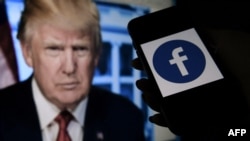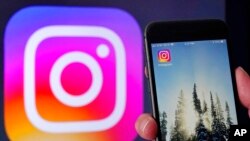Former U.S. President Donald Trump will be allowed to use Facebook and Instagram again soon. Meta, the platforms' parent company, said Wednesday that it would lift bans imposed two years ago after Trump used both services to publish false claims about the 2020 election and to help rally the crowd that assaulted the U.S Capitol on January 6, 2021.
The company said that its decision to ban Trump was made out of concern that he represented a "serious risk to public safety." However, Meta said, it has since concluded that that risk "has sufficiently receded" to allow his return, and that his accounts would be restored "in the coming weeks."
Because of Trump's prominent role in U.S. politics, it is important that the public hears what he has to say, Meta said. But because of his history with both services, his conduct on the platforms will be monitored.
"In light of his violations, he now also faces heightened penalties for repeat offenses — penalties which will apply to other public figures whose accounts are reinstated from suspensions related to civil unrest under our updated protocol," Meta said in a statement. "In the event that Mr. Trump posts further violating content, the content will be removed and he will be suspended for between one month and two years, depending on the severity of the violation."
Trump reacts
Having been banned from almost all major social media platforms until recently, Trump has been posting his statements on Truth Social, a platform that he helped found and his company owns.
In response to Meta's announcement, Trump posted on Truth Social, using his usual idiosyncratic punctuation and capitalization.
"FACEBOOK, which has lost Billions of Dollars in value since 'deplatforming' your favorite President, me, has just announced that they are reinstating my account," he wrote. "Such a thing should never again happen to a sitting President, or anybody else who is not deserving of retribution! THANK YOU TO TRUTH SOCIAL FOR DOING SUCH AN INCREDIBLE JOB. YOUR GROWTH IS OUTSTANDING, AND FUTURE UNLIMITED!!!"
Trump has approximately 34 million followers on Facebook and more than 23 million followers on Instagram.
Controversial decision
"Like it or not, President Trump is one of the country's leading political figures and the public has a strong interest in hearing his speech," Anthony Romero, executive director of the American Civil Liberties Union, said in a statement.
"The biggest social media companies are central actors when it comes to our collective ability to speak — and hear the speech of others — online," Romero said. "They should err on the side of allowing a wide range of political speech, even when it offends."
The Anti-Defamation League, an organization that combats hate speech and other forms of extremism, took a different view. Its CEO, Jonathan Greenblatt, said in a statement that "former President Trump should not be given a platform to amplify his hateful and violent rhetoric on mainstream social media."
"During his presidency Trump used social media platforms such as Facebook to spread hate and incite violence," Greenblatt continued. "There is no reason to believe the former president will behave differently now that the platform has reversed his ban. This isn't a matter of free speech; there are ample services that Trump can use to spread his message. This is a business decision to platform bigotry and divisiveness to drive clicks and engagement, plain and simple."
Broad reassessment
Meta's reinstatement of Trump comes amid a broad reassessment of how social media should be moderated in the U.S. and worldwide. In October, billionaire Elon Musk purchased Twitter and restored access to many previously banned accounts, including Trump's. The former president, who has nearly 88 million followers on the platform, has not used it.
Experts said that the new ways major social media companies are handling controversial speech are part of a larger debate about how society should organize itself in an age of extreme interconnectedness.
"We're now debating how we regulate the public square in the 21st century," said Gene Policinski, senior fellow for the First Amendment at the Freedom Forum, a nonpartisan educational foundation. "These are places where we now gather to talk about public issues."
"We're now at this inflection point where clearly social media has gone from a toy to a tool, to a ubiquitous need," Policinski told VOA. "When it becomes that essential to the way our society functions, there may be an argument to offer some sort of safety net for the kinds of speech that people might find repugnant, but which does not pose an imminent threat of violence or some other criminal conduct."
Court case pending
Later this year, the U.S. Supreme Court will consider the future of Section 230 of the Communications Decency Act. The law has been interpreted as absolving social media companies from legal responsibility for third-party content published on their platforms while allowing them to bar content largely at will.
In the U.S., many conservatives believe that when the major social media firms do exercise the right to bar content, they do so in a way that disadvantages the political right. They would like the Supreme Court to curtail companies' ability to stifle some speech.
Many on the left, by contrast, would like to see social media firms shoulder more legal responsibility for the material they host, claiming that abusive, hateful content frequently remains on the platforms even after it has been identified as such.
International concern
The debate extends beyond U.S. politics. Earlier this month, the Office of the U.N. High Commissioner for Human Rights issued a statement attributed to dozens of international human rights experts.
The statement, aimed at the leaders of the major social media platforms, urged them "to center human rights, racial justice, accountability, transparency, corporate social responsibility and ethics in their business model" and reminded them that "corporate accountability for racial justice and human rights is a core social responsibility."
Rocky road
As social media platforms reassess policies, some bumps in the road seem inevitable.
To date, not all of the reinstatements have gone well. For example, Twitter restored the account of well-known Holocaust-denying white nationalist Nick Fuentes on Tuesday. Fuentes was recently in the news for accompanying Ye, the rapper formerly known as Kanye West, to a dinner with Trump at the former president's Florida resort, Mar-a-Lago.
Once his account was restored, Fuentes immediately began posting material that referred to antisemitic comments made by Ye. Then, in a livestreamed Twitter Spaces event, he made other antisemitic comments.
Fuentes' account was suspended again, less than 24 hours after its reinstatement.





